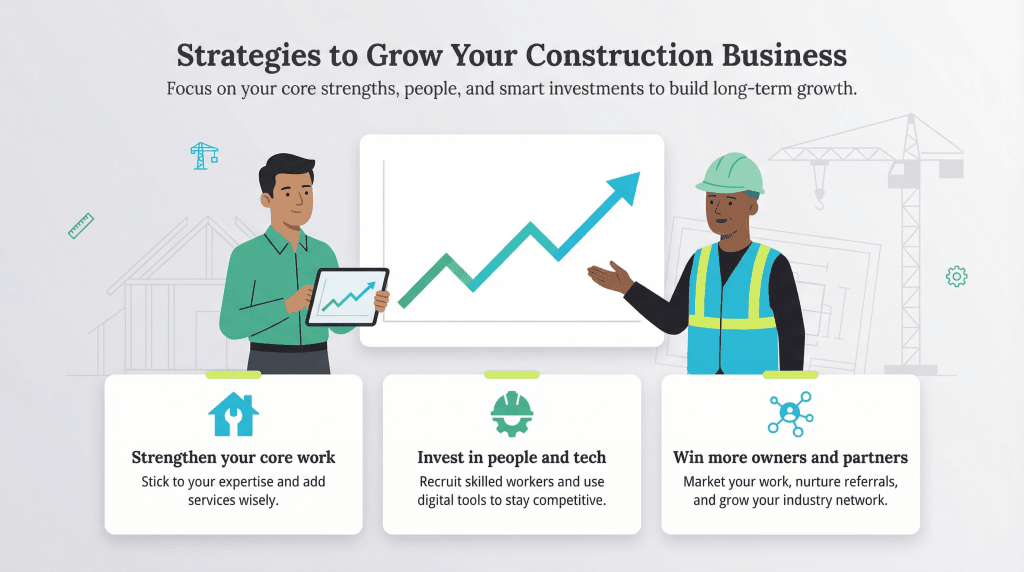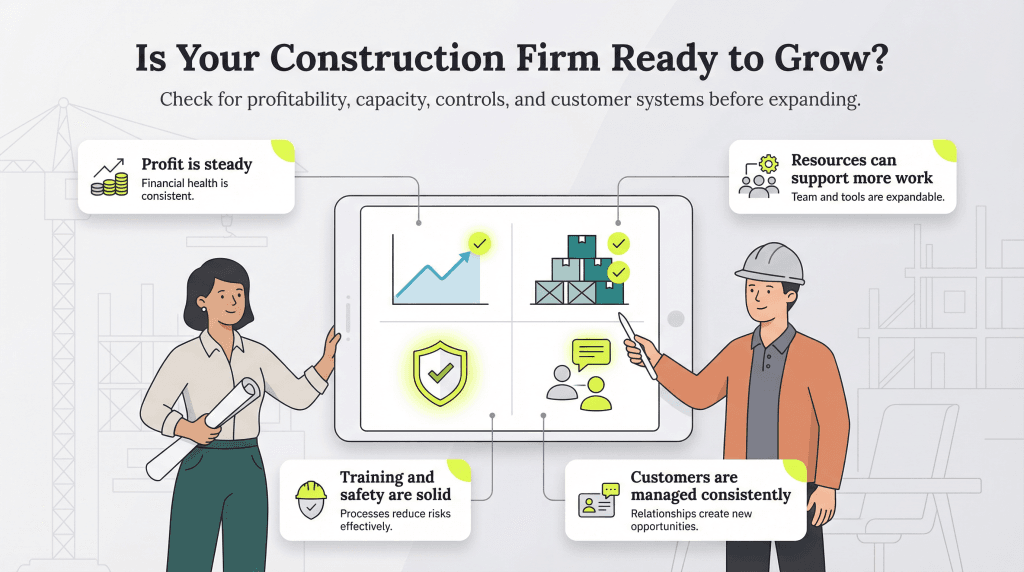The forecast for much of the construction industry looks bright, with growth expected in the home, commercial and infrastructure specialties. Does that mean it’s time to expand your construction business?
Editor’s note: Looking for a business loan? If you’re looking for information to help you choose the one that’s right for you, use the questionnaire below to receive information from a variety of vendors for free:
Growth has its appeal in terms of potential profits, but it needs serious consideration before you put money and effort into expansion. Business expansion can increase your liability, financial and operational risks, for example, as well as your need for more employees, supplies and administration. Expanding too fast, however, is one of the top factors that leads to business failure. It’s vital to grow intelligently, and having a business growth plan may not be enough.
Are you ready to take your business to the next level? Let’s take a look at key strategies for growing your construction firm.
According to the
Bureau of Labor Statistics, approximately 45 percent of new businesses fail in the first five years. Even famous entrepreneurs like Steve Jobs and Bill Gates crashed and burned at least once before finding success.
6 strategies to grow your construction business
Here are six strategies to help you grow your construction business.
1. Grow in your core competency.
In construction, the smartest way to grow is within your established area of expertise. That way, you are not learning a new niche, with all its regulations and special considerations, on top of the challenges of growing your company. Here are three common ways to grow your business.
- Acquire a new company. By finding a company that is established in its market area, you immediately gain trained employees, an established client list and a known commodity in its location. Of course, if the company has problems, your first order of business will be to resolve those issues. At the same time, find out the procedures it did well. Is there something you can apply to your business as a whole?
- Add a specialty within your core competency. If you build houses, for example, finishing basements or constructing add-ons may be an area of expansion you could easily schedule in, especially during slow periods.
- Attract higher-paying clients with a luxury niche or upgrades. Solar technology, in-law apartments and microhouses are increasingly popular.
2. Market to attract new customers while encouraging repeat business.
Marketing is an important part of any business. As you expand your area of influence, you need to embrace that aspect of business with as much attention as you give to budgeting or operations.
Person-to-person marketing — particularly word of mouth — is a mainstay of construction marketing. As you grow, don’t forget that vital area.
- Bring back previous customers. Encouraging repeat customers may not be as easy in the construction business as it is in industries like retail, but it’s still an important part of any marketing strategy.
- Meet the neighbors. When you are working a job, it pays to have some of your more people-oriented employees walk the neighborhood, introducing themselves to the locals and letting them know about the work you do. You can also drop off a card with an offer to give an estimate while in the neighborhood.
- Offer referral rewards. Encourage referrals by offering something — a discount or upgrade for current clients or a monetary reward or free handyman service for past customers.
- Keep your online presence up to date. Referrals and recommendations are no longer sufficient in our increasingly online society, even for local businesses. Make sure your contact information is up to date in the Yellow Pages, Yelp, Google and other online directories. Glowing recommendations mean nothing if a potential client can’t find you.
- Gear your website toward converting viewers into leads. Give a clear statement of what your company does and why it stands out. Include customer testimonials, awards and a digital portfolio of finished work. Display your contact information prominently on every page. Offer an incentive, such as free information, in exchange for visitors’ contact information.
3. Find employees.
One of the greatest challenges facing construction today is the shortage of skilled workers. A survey by the Associated General Contractors of America found that 89 percent of contractors are having trouble filling hourly positions and 86 percent are struggling to fill salaried positions. A primary contributor to the shortage is the general emphasis on preparing young people for college as opposed to the workforce. There are, however, things you can do:
- Offer a good salary and benefits. It should go without saying, but people in construction are looking to make a good living. High, competitive compensation packages are a must.
- Offer a good working environment. Safety, managers who care, and a culture that supports the employee and fosters a strong work ethic will attract workers who may be discouraged by their current employers.
- Work with an agency. There are staffing services that specialize in labor as opposed to clerical hires.
- Work with local schools. High schools and community or vocational colleges are often eager to partner with businesses in internship or co-op programs (multiterm programs in which the student alternates between working one term and attending class the next). The programs not only provide less-experienced labor more cheaply, but they also allow you to train potential employees to hire after graduation.
- Hire from other industries. Some industries, such as the oil industry, have workers with skills that transfer well to construction.
- Take advantage of government programs. Participate in the Helmets to Hardhats program. The federally funded program connects military veterans looking for work with construction companies.
- Work with manufacturers. Partnering with various manufacturers allows you to include installation with sales. Have your window company, for example, install the windows to free up your employees for other work.
- Provide continuing education for your employees. Train interested employees in other areas of expertise, and encourage experienced employees to mentor newer ones.
4. Fund growth.
Even if your company is making a tidy profit now, there are expenses associated with growth. You may need the upfront capital to acquire an existing company, or a new project may mean buying or renting new equipment and purchasing supplies.
Of course, the best thing you can do for funding your construction firm is to bid intelligently. You may be tempted to bid low to receive a new contract, but that’s not always the best strategy. People may be suspicious of the lowest bid and willing to pay a little more to ensure good quality. [Read related article: Elevating Expectations: 5 Ways Product Quality Affects Your Brand]
If you have a price list in place for services, reevaluate it. Are you accounting for potential increases in input costs? Are there costs you can reduce in one area and increase elsewhere? By reducing cost on some items, you can show the customer you are balancing their interests with your needs.
Finally, whether you’re getting funding or bidding on a job, be sure you have a cushion for things that could go wrong.
5. Adapt to new technology.
“While the old saying ‘don’t fix what isn’t broken’ is true, a new perspective can be applied: Improve what is working,” said Shad Elia, founder and president of New England Home Buyers. “While adapting to new technology can be challenging, with patience and dedication, the rewards can be tremendous.”
Elia recommended looking at the advancements in the construction industry’s software as one possibility. You could employ technologies such as data-collection apps, drones, building information modeling software, virtual reality and wearables, 3D printing, and artificial intelligence. All of those are expected to grow in availability, popularity and accuracy over the next few years.
“Despite increased digitization in recent years, construction is still lagging behind other sectors in terms of adopting new technologies,” said Mark Perkins, business development director at Peak AI. “It’s a complex and traditional industry that operates on tight margins, and introducing new ways of working can often be deemed to carry high risk.” [Read related article: How Machine Learning Is Boosting Business Growth]
6. Expand your network.
“Being within a specific trade association has its benefits to help contractors and construction business owners expand their network,” said Matt Swann, president of Brawn Construction. “Most trade associations offer conferences, events and meetings to allow these workers to meet others in a similar industry.” Swann advised never to burn any bridges and to leverage your business card. “This allows others to remember and stay in contact with you if they want to hire your company to work on a specific project, allowing you to build your reputation.”
Swann said networking at actual job sites is also crucial, because it allows you to meet various contractors to potentially work with in the future.
“Along with the relationship building, you get access to vital information and strategies from experts coming from different places,” said Richard Fung, president of Forever Homes Inc. “Ultimately, you get to expand your firm both by you and by the help of other experts or organizations through attending those events.”
While you are cross-promoting related services, such as electricians or HVAC, to build a broader network, consider donating a portion of your time or money back to the community you serve. Whether you sponsor a local sports team or help neighbors in need, having a positive reputation in your local area can significantly increase visibility.
How to determine if your construction firm is ready for growth
If you’re curious to know whether your construction firm is ready for growth, here are a few key indicators:
- You have a consistent, steady profit. The first step is to make sure your business is ready to handle the increased responsibility. In general, your business should make steady and consistent profit, according to Thomas Schleifer, author of “Construction Contractors’ Survival Guide.” In addition to assessing your profits, ask yourself these questions: Do you have repeat customers? Are you getting referrals? Are you getting consistent, positive customer feedback? Are you retaining employees?
- You have the equipment, money and manpower to increase your workload. Assess how well your management can take on the increased workload. A larger business with more projects and a wider territory means more employees, more expenses, more accounts receivable, more equipment and more marketing — in short, more working parts to keep running smoothly.
- You have sufficient training, safety and quality controls in place. Make sure your training program and your safety and quality control procedures are established and efficient. Check that they can adequately handle the greater load. You will need a consistent process in place for acquiring, moving, and tracking equipment and supplies.
- You have an established customer management program in place. Naturally, you should have personnel and processes dedicated to not only reaching out to new customers, but also following up with current ones and touching base with previous ones.
Before expanding, you will also need a clear mission statement that reflects the qualities that differentiate you from the competition.
Construction is not a grow-or-die business
We’ve all heard the adage “grow or die.” It’s not a given for construction, however. Expanding your construction firm can lead to increased profits if done well, it brings greater challenges than with other businesses. When not handled correctly, growth can actually kill a construction company.
Look at your customer base and territory before making any development plans. Make sure you can get the skilled labor and funding to support your increased responsibilities. With all those areas working smoothly, you will be able to expand your construction firm successfully.
Julie Thompson and Skye Schooley contributed to the reporting and writing in this article. Source interviews were conducted for a previous version of this article.






